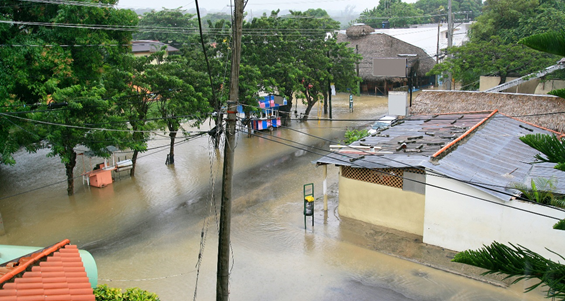Climate change adaptation a priority in flood-threatened Indonesia
Jakarta has been increasingly threatened by flooding from a combination of land subsidence, rising sea-levels and higher river levels due to increasing rainfall intensity and land-use changes within the catchment areas. UNEP-DHI, together with Climate Technology Centre and Network (CTCN) and Jakarta Research Council (JRC), has collaborated on a project to provide technical assistance to mitigate the impacts of flood in densely-populated Jakarta.
In order to address these threats, strategies that the government initiative have come up with include the assessment of a Giant Sea Well (GSW) to reduce the risk of flooding and coastal inundation. As a result of climate change, there is an increasing need to ensure infrastructure resilience, sustainable water resources management, and provision of improved disaster management capabilities. With DHI’s comprehensive expertise in water environments, and advanced downscaling techniques, solutions to mitigate these effects to climate change can be rendered.
Amongst the objectives of the technical assistance is to better assess flood risks and hazards, and design climate-resilient pathways to reduce the magnitude and scale of the impacts from this flooding. This assessment and strategy-definition will help shape the design of climate resilient infrastructure projects. Further, with this technical assistance, authorities will be able to manage the 13 rivers that flow through Jakarta, run the GSW Jakarta project and overcome the problem of sea level rise as a result of climate change.

Floods greatly impact the densely-populated Jakarta, and affects the lives and livelihoods of the local community. © Shutterstock / photopixel
From the project, a series of outcomes have been projected:
• A hydrodynamic flood model to be installed for evaluation of hard and soft engineering interventions to reduce flood-risks
• A socio-cultural survey to be carried out to examine inhabitants’ perceptions of flooding
• A series of technology transfer workshop to be conducted to increase local capacity in hydrodynamic modelling
• Recommendations of resultant policy and planning to reduce flood hazards and risks
• A development of a roadmap to sustain and expand the project
Indonesia’s flood threats have increased over the years, impacting the lives and livelihoods of the locals. With shared knowledge and new technology, the impacts of floods can hopefully be mitigated and lives can continue without much disruption if the next flood event occurs.
‘With the project and the expected outcomes of it, including hydrodynamic flood model, survey of locals perceptions and technology transfer workshop, we hope to lessen the impact and destruction of flood events on Jakarta.’ - Dr. Budy Wiryawan, DHI
Read more